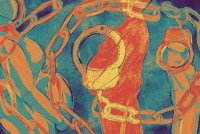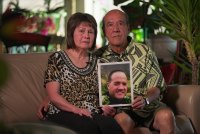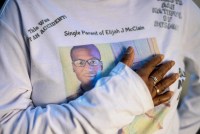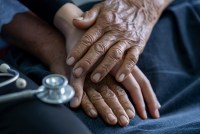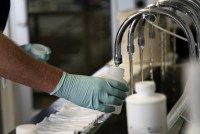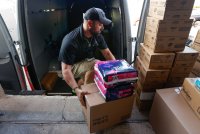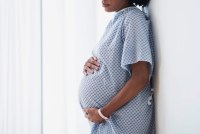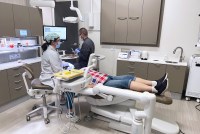Latest KFF Health News Stories
Doctors on (Video) Call: Rural Medics Get Long-Distance Help in Treating Man Gored by Bison
A rural South Dakota medic said using an ambulance video system to communicate with a doctor gave him peace of mind as he treated a patient who was seriously injured when gored by a bison.
Extra Fees Drive Assisted Living Profits
The add-ons pile up: $93 for medications, $50 for cable TV. Prices soar as the industry leaves no service unbilled, out of reach for many families.
Most States Ban Shackling Pregnant Women in Custody, Yet Many Report Being Restrained
Advocates for pregnant people in police custody say repeated incidents show prohibitions on handcuffs and other restraints are little more than lip service.
La resistencia a empezar más tarde tiene menos que ver con dificultades logísticas y financieras, sobre todo en aspectos básicos como el transporte escolar.
As Transgender ‘Refugees’ Flock to New Mexico, Waitlists Grow
As many states have moved to restrict or ban gender-affirming care for trans people, a few states, including New Mexico, have codified protections. But those laws don’t always mean accessing care is simple or quick, as a surge in new patients in the state collides with limited doctors and clinics.
Science Says Teens Need More Sleep. So Why Is It So Hard to Start School Later?
Sleep deprivation in adolescents is linked to mental health struggles, worse grades, traffic accidents, and more. That’s why states such as California and Florida have mandated later high school start times. But opposition to later times is less about the science than it is about logistics and costs.
Doctors Abandon a Diagnosis Used to Justify Police Custody Deaths. It Might Live On, Anyway.
The American College of Emergency Physicians agreed to withdraw its 2009 white paper on excited delirium, removing the only official medical pillar of support left for the theory that has played a key role in absolving police of culpability for in-custody deaths.
Police Blame Some Deaths on ‘Excited Delirium.’ ER Docs Consider Pulling the Plug on the Term.
The American College of Emergency Physicians will vote in early October on whether to disavow its 2009 research paper on excited delirium, which has been cited as a cause of death and used as a legal defense by police officers in several high-profile cases.
Despite Successes, Addiction Treatment Programs for Families Struggle to Stay Open
Residential addiction treatment programs that allow parents to bring their children along have been recognized for their success. But a mix of logistical challenges and low reimbursement rates mean they struggle to stay afloat.
New Alzheimer’s Drug Raises Hopes — Along With Questions
Clinics serving Alzheimer’s patients are working out the details of who will get treated with the new drug Leqembi. It won’t be for everyone with memory-loss symptoms.
In Wisconsin, Women’s Health Care Is Constricted by an 1849 Law. These Doctors Are Aghast.
From the front lines of Wisconsin’s abortion battle, obstetricians describe patients who cannot comprehend having to carry nonviable pregnancies. And only one pharmacist in town can be found who will fill prescriptions for abortion pills.
Proposed PFAS Rule Would Cost Companies Estimated $1B; Lacks Limits and Cleanup Requirement
A proposed Environmental Protection Agency rule calls for companies to disclose PFAS manufactured or imported since 2011. The chemical industry is upset because such compliance would cost an estimated $1 billion, while environmental health advocates worry because the rule wouldn’t ban the chemicals outright.
More States Drop Sales Tax on Disposable Diapers to Boost Affordability
Last month, Florida joined a growing number of states in banning sales taxes on diapers to make them more affordable for older adults and families with young children. Though diapers are essential for many, they are not covered by food stamps. Nor are incontinence products for older adults typically covered by Medicare. The cost can easily add up on a fixed income.
The DEA Relaxed Online Prescribing Rules During Covid. Now It Wants to Rein Them In.
Supporters say the proposed rules would balance the goals of increasing access to health care and helping prevent medication misuse. Opponents say the rules would make it difficult for some patients — especially those in rural areas — to get care.
Black, Rural Southern Women at Gravest Risk From Pregnancy Miss Out on Maternal Health Aid
A federal program meant to reduce maternal and infant mortality in rural areas isn’t reaching Black women who are most likely to die from pregnancy-related causes.
Dental Therapists Help Patients in Need of Care Avoid the Brush-Off
Dental therapists are licensed providers who offer basic care traditionally provided by dentists, including fillings and simple tooth extractions. But opposition from interest groups and the profession’s relative newness mean more than two-thirds of states don’t yet have them.
Abortion Clinics in Conservative-Led States Face Increasing Legal Threats
Since the U.S. Supreme Court reversed federal protections for abortions, medical providers in conservative-led states have been fighting legal and political battles — as well as escalating threats from the anti-abortion movement.
States Step In as Telehealth and Clinic Patients Get Blindsided by Hospital Fees
At least eight states have implemented or are considering limits on what patients can be billed for the use of a hospital’s facilities even without having stepped foot in the building.
Minnesota Overhauled Substance Use Treatment. Rural Residents Still Face Barriers.
A recent policy change in Minnesota promotes quick evaluations and care for people with substance use disorders. But because of gaps riddling rural treatment systems nationwide, the promise of swift care isn’t reaching rural Minnesotans.
Temp Nurses Cost Hospitals Big During Pandemic. Lawmakers Are Now Mulling Limits.
Missouri is considering making it a felony to jack up temporary health care staffing prices during a statewide or national emergency. It’s one of at least 14 states looking to reel in travel nurse costs, after many hospitals struggled to pay for needed staffers earlier in the covid pandemic.





